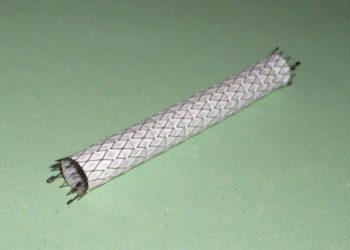Clinical prediction rule assesses harm/benefit of dual antiplatelet therapy after angioplasty
1. A prediction model for assessing the harm and benefit of long-term dual antiplatelet therapy after percutaneous coronary intervention (PCI) was able to accurately identify patients with the highest risk of ischemia.
2. Patients with high-risk of ischemia after PCI who were maintained on aspirin and thienopyridine had a significantly reduced risk of an ischemic event than those who took aspirin alone, with no increase in the risk of bleeding.
Evidence Rating Level: 2 (Good)
Study Rundown: PCI, commonly known as angioplasty, is performed urgently in patients presenting with myocardial infarction (MI) or other acute coronary syndromes. After PCI, most patients are started on dual antiplatelet therapy, which, despite increasing the risk of bleeding, has been shown to decrease the risk of stent thrombosis and recurrent MI. Given these tradeoffs, the optimal duration of dual antiplatelet therapy remains a topic of much debate. This study thus enrolled patients who had not experienced an ischemic or hemorrhagic event after 1 year of dual antiplatelet therapy (consisting of aspirin and thienopyridine), and randomized them to receive 18 months of continued aspirin plus thienopyridine or aspirin alone. The study also analyzed the baseline characteristics of all enrolled patients to calculate a clinical risk score for ischemic events, including factors like age, comorbidities, and type of stent.
Patients at high-risk for an ischemic event (with a score of 2 or more, see below for specific calculation) were found to benefit from prolonged dual antiplatelet therapy, demonstrating a decreased risk of ischemia and no change in the risk of bleeding. Meanwhile, those at low-risk for an ischemic event (score < 2) fared worse on dual antiplatelet therapy, with increased bleeding and no appreciable effect on ischemia. In sum, this study was able to identify patients at high- and low-risk of ischemic events after PCI, and found differences in the balance of risks and benefits of prolonged dual antiplatelet therapy. However, more prospective studies are needed to better define the utility of this risk calculator on patient care.
Click to read the study in JAMA
Relevant Reading: Twelve or 30 months of dual antiplatelet therapy after drug-eluting stents
In-Depth [prospective cohort]: This study performed a secondary analysis of the DAPT Study cohort, which randomized 11 648 patients who had received 1 year of combination aspirin and thienopyridine without experiencing an ischemic or hemorrhagic event, to receive 18 additional months of the same therapy or aspirin alone. Patients were followed up only during the 18 months after randomization, and the rates of any ischemic (including MI and stent thrombosis) or hemorrhagic event were recorded. This study then derived a risk calculator which assigned 1 point for MI at presentation, history of MI or PCI, stent diameter < 3mm, smoking, and paclitaxel-eluting stent; 2 points for history of CHF with low ejection fraction and vein graft intervention; -1 point for age 65–75; and -2 points for age >75 years. Patients at high-risk for an ischemic event were defined as those with 2 or more points from the calculator. High-risk patients were found to benefit from prolonged dual antiplatelet therapy, with a decreased risk of ischemia (2.7% vs 5.7%; risk difference (RD) -3.0%, 95%CI -4.1 to -2.0%) and no change in the risk of bleeding (1.8% vs 1.4%; RD 0.4%, 95%CI -0.3 to 1.0%). Low-risk patients, on the other hand, had no ischemic protection from dual antiplatelet therapy (1.7% vs 2.3%; RD -0.7%, 95%CI -1.4 to 0.09%), and had an increased risk of bleeding (3.0% vs 1.4%; RD 1.5%, 95%CI 0.8 to 2.3%).
Image: PD
©2016 2 Minute Medicine, Inc. All rights reserved. No works may be reproduced without expressed written consent from 2 Minute Medicine, Inc. Inquire about licensing here. No article should be construed as medical advice and is not intended as such by the authors or by 2 Minute Medicine, Inc.









